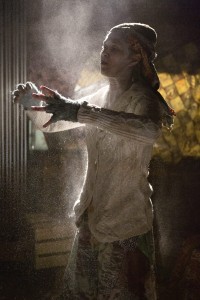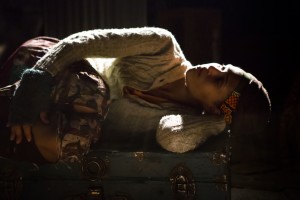What can we truly say to own in this life? Our homes, our gods? Our own mortality and deaths? Ndebele Funeral, written by Zoey Martinson, directed by Awoye Timpo, and presented by Smoke and Mirrors Collaborative, brilliantly uses this theme of ownership as an aspect of the human condition to present a multifaceted, complex and utterly transcendent work of theater.
This is no mere AIDS play nor post-apartheid post-colonial drama, though it engages the real-world stakes of both of those issues. Rather, it is an emotionally-driven exploration of what it means to have faith in something when we have so little control over our own fates. It delves into the question of what it means to be human in a world where the odds always seem stacked against humankind.
We meet Daweti (played by Martinson) awakening in a strange sort of bed, which we later learn is a self-constructed coffin, a personally designed final resting place. The action of the drama centers around her interactions with the day's two visitors: her longtime best friend Thabo (Yusef Miller) and a fieldworker for the government, Jan (Jonathan David Martin), on-site at her shack to take stock of how well she has used some subsidized building materials. Of course, we can surmise that she has put them to good use; the house she has built is not to live in now, but for her imminent future.
The richness of this play is not just in its honest story, which shows us both bits of Daweti's past with Thabo and touches of the difficult present that each of the three characters face. Much of what makes this play so meaningful is the way in which it is told — a fourth-wall breaking style of performance, that incorporates music, rhythm, physicality, and narrative storytelling, interspersed throughout the forward-moving action. Because of this, the world of this play seems blessed with the same magic that each of its characters is trying to capture in his or her own life.
The actors are all exceptionally good in their roles. They bring these characters to life as complicated individuals, not just as mouthpieces for the various philosophical perspectives presented in the text. Miller makes Thabo joyful yet haunted, a perfect counterpart to Martinson's harsh but charming Daweti. Martin creates an utterly sympathetic Jan who, rather than feeling like the oppressor, displays the vulnerability of his social position while still attempting to exert power over his circumstances.
The setting, in its simplicity, brings to life Daweti's messy, unfinished shack, with a sense of reality, even though it merely suggests the completed structure. The only drawback is the lighting, which at times to create moods, becomes a bit too dark to allow the audience to really engage with the facial expressions of the actors on stage.
All in all, Ndebele Funeral is everything great theater should be: it is entertaining with its humor and musical numbers; it is thought-provoking in its philosophizing and use of historical information; and it is heart-wrenching in its representation of the depths that we will go to in the name of love and friendship. If the one thing we can own is our memories, then this is a work to keep with us, long after the house lights have come on. It is a play that reminds us of the impact that the lives of others have on us. And that is a connection not easily severed, even if we do commit to never look back.



